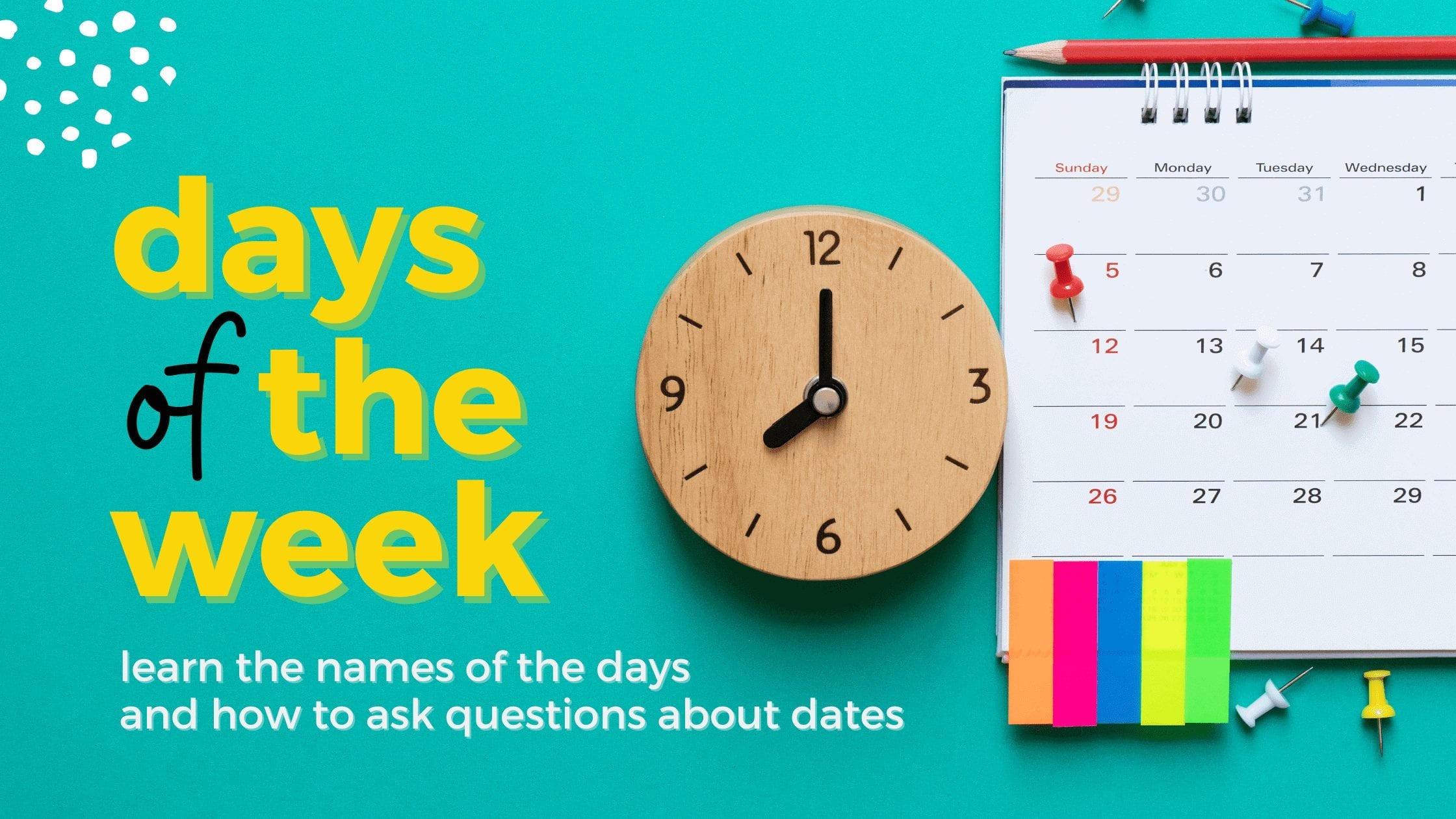Learn All the Days of the Week in English
Have you ever wondered why we have a seven-day week? Or where did the names Monday, Tuesday, Wednesday, etc come from? Today we will teach you the days of the week in English as well as some curious facts about this topic.
Say, write, and ask questions about dates
Learning the days of the week in English and words such as ‘today’ and ‘tomorrow’ is important for you to be able to talk about your schedule, for instance. Besides learning the names of the days of the week in English, we will teach you how to ask questions about time, how to use ordinal numbers to talk about dates, and how to use prepositions and articles correctly with the days of the week. But first, let’s check some history about the names of the seven days of the week.
The solar system and time
We measure a day by counting the time it takes for the Earth to completely spin around. The year is measured by the revolution of the Earth around the sun. It usually takes 365 and ¼ days. Every four years we add an extra day in February and that’s what we call a leap year — in fact, 2020 is a leap year.
The seven days of the week were named after the sun, the moon and five other planets: Mercury, Venus, Mars, Jupiter, and Saturn.

- SUNDAY: the first day of the week was named after the Sun.
- MONDAY: the first business day of the week was named after the Moon.
- TUESDAY: Tuesday was named after the God of War known as Mars. Tuesday comes from this name in Germanic, which is Tiu. Therefore, we have Tuesday.
- WEDNESDAY: the Roman god that the fourth day of week was named after is Mercury, or Woden in Germanic. Woden’s day became Wednesday.
- THURSDAY: Thor is the god of Thunder. Thor’s day eventually became Thursday.
- FRIDAY: Venus is the goddess of love and beauty for the Romans and Fria is the Teutonic’s goddess of love. Friday comes from the Germanic name as well.
- SATURDAY: Saturday comes from Saturn, the God of agriculture.
Weekdays and the weekend
- Weekdays are days in which business operations are conducted (usually Monday to Friday).
- The weekend days are Saturday and Sunday.
Prepositions and articles
We always use the preposition on when talking about the days of the week. Let’s look at some examples:
- I never work on Mondays.
- I will go to Paris on Friday night.
- I went to that new restaurant on Sunday. I loved it!
We don’t use the article ‘the’ before days of the week, unless we are talking about a specific day. Here are some examples of situations in which you would use ‘the’ before the day of the week you are referring to:
- Thanksgiving is always celebrated on the last Thursday of November.
- She will go to Australia on the first Monday of October.
- We only use the article ‘the’ when we are talking to a specific day.
Today, tomorrow, yesterday
When talking about days, we often use the words ‘today’, ‘tomorrow’ and ‘yesterday’. Today refers to the present, tomorrow to the future, and yesterday to the past. Remember to use the right verb with each one of them.
Today
- Today is my birthday. I am turning 30!
- Today is going to be a busy day. I have so much to do!
Yesterday
- Yesterday was so cold I had to wear a sweater.
- Yesterday was a slow day at the clinic.
Tomorrow
- Tomorrow is Joan’s party. Are you excited about it?
- I know you had a bad day today, but tomorrow will be better!
The day before yesterday
- I had an appointment with Dr. Williams the day before yesterday.
- I went to Denver the day before yesterday.
The day after tomorrow
- I’m meeting Julia the day after tomorrow.
- She is hosting a baby shower the day after tomorrow.
Days and dates
We always use ordinal numbers to talk about dates. The table below can help you revise the ordinal numbers.
| Cardinal number | Ordinal number |
| 1 | First |
| 2 | Second |
| 3 | Third |
| 4 | Fourth |
| 5 | Fifth |
| 6 | Sixth |
| 7 | Seventh |
| 8 | Eighth |
| 9 | Ninth |
| From 10 to 19 we continue to add -th to the number to create cardinal numbers. | From 20 to 31 we say: 20 – twentieth 21 – twenty-first 22 – twenty-second 23 – twenty-third 24 – twenty-fourth And so on… |
How to ask what day it is
- What day is today/tomorrow?
It’s Monday or It’s Monday tomorrow.
- What’s the day today/tomorrow?
Today is Tuesday or Tomorrow is Tuesday.
How to ask the date
- What’s the date today/tomorrow?
It’s August 3rd.
- What’s today’s date/tomorrow’s date?
Tomorrow is July 21st.
Practice time: answer these questions
- What’s your favorite day of the week? Why?
- What’s your least favorite day of the week?
- Do you work only on weekdays or do you also work on weekends?
- What day is tomorrow?
- Do you like Mondays?
Listening exercise: Julia’s week in New York

